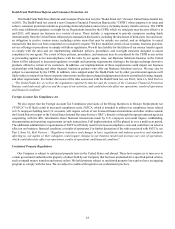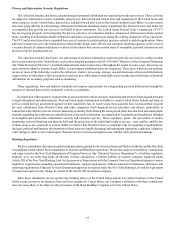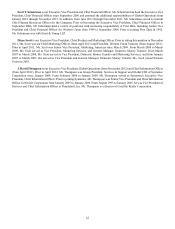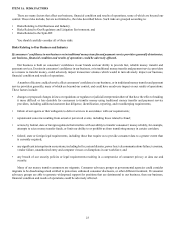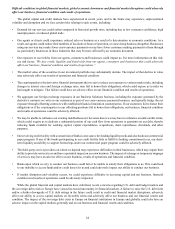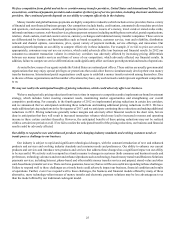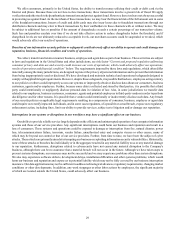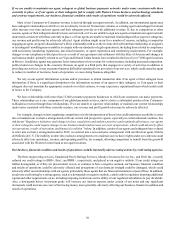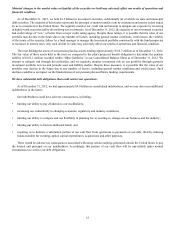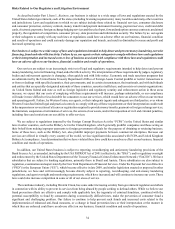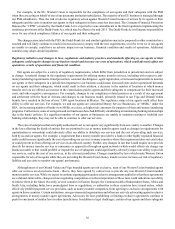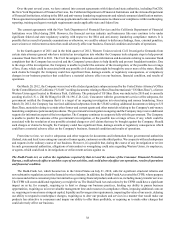Western Union 2012 Annual Report Download - page 33
Download and view the complete annual report
Please find page 33 of the 2012 Western Union annual report below. You can navigate through the pages in the report by either clicking on the pages listed below, or by using the keyword search tool below to find specific information within the annual report.28
• enforcement of intellectual property rights in some foreign countries;
• difficulty entering new markets with the services of the acquired businesses; and
• general economic and political conditions, including legal and other barriers to cross-border investment in general, or by
United States companies in particular.
Integrating operations could cause an interruption of, or divert resources from, one or more of our businesses and could result
in the loss of key personnel. The diversion of management's attention and any delays or difficulties encountered in connection
with an acquisition and the integration of the acquired company's operations could have an adverse effect on our business, financial
condition and results of operations.
As of December 31, 2012, we had $3,179.7 million of goodwill comprising approximately 34% of our total assets, including
$1,947.7 million of goodwill in our Consumer-to Consumer reporting unit and $996.0 million of goodwill in our Business Solutions
reporting unit. TGBP represents a significant majority of the goodwill related to the Business Solutions reporting unit. For the
Business Solutions reporting unit, a decline in estimated fair value of approximately 10% could occur before triggering an
impairment of goodwill. If we or our reporting units do not generate operating cash flows at levels consistent with our expectations,
we may be required to write down the goodwill on our balance sheet, which could have a significant adverse impact on our financial
condition and results of operations in future periods. See the “Critical Accounting Policies and Estimates” discussion in Part II,
Item 7, Management's Discussion and Analysis of Financial Condition and Results of Operation, for more detail.
We face credit, liquidity and fraud risks from our agents, consumers and businesses that could adversely affect our business,
financial condition and results of operations.
The vast majority of our global funds transfer business is conducted through third-party agents that provide our services to
consumers at their retail locations. These agents sell our services, collect funds from consumers and are required to pay the proceeds
from these transactions to us. As a result, we have credit exposure to our agents. In some countries, our agent networks include
superagents that establish subagent relationships; these agents must collect funds from their subagents in order to pay us. We are
not insured against credit losses, except in certain circumstances related to agent theft or fraud. If an agent becomes insolvent,
files for bankruptcy, commits fraud or otherwise fails to pay money order, money transfer or payment services proceeds to us, we
must nonetheless pay the money order, complete the money transfer or payment services on behalf of the consumer.
The liquidity of our agents is necessary for our business to remain strong and to continue to provide our services. If our agents
fail to settle with us in a timely manner, our liquidity could be affected.
From time to time, we have made, and may in the future make, short-term advances and longer term loans to our agents. These
advances and loans generally are secured by settlement funds payable by us to these agents. However, the failure of these borrowing
agents to repay these advances and loans constitutes a credit risk to us.
In our Business Solutions business, we are also exposed to credit risk relating to foreign currency forward and option contracts
written by us to our customers. The duration of these derivative contracts at inception is generally less than one year. The credit
risk associated with our derivative contracts increases when foreign currency exchange rates move against our customers, possibly
impacting their ability to honor their obligations to deliver currency to us or to maintain appropriate collateral with us. If a customer
becomes insolvent, files for bankruptcy, commits fraud or otherwise fails to pay us for the value of these contracts, we may be
exposed to the value of an offsetting position with a financial institution counterparty.


